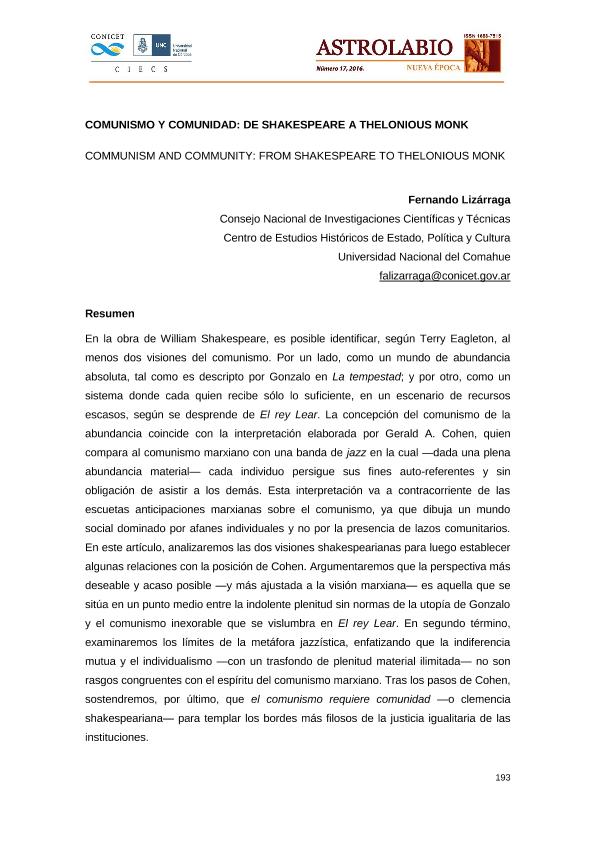Artículo
En la obra de William Shakespeare, es posible identificar, según Terry Eagleton, al menos dos visiones del comunismo. Por un lado, como un mundo de abundancia absoluta, tal como es descripto por Gonzalo en La tempestad; y por otro, como un sistema donde cada quien recibe sólo lo suficiente, en un escenario de recursos escasos, según se desprende de El rey Lear. La concepción del comunismo de la abundancia coincide con la interpretación elaborada por Gerald A. Cohen, quien compara al comunismo marxiano con una banda de jazz en la cual —dada una plena abundancia material— cada individuo persigue sus fines auto-referentes y sin obligación de asistir a los demás. Esta interpretación va a contracorriente de las escuetas anticipaciones marxianas sobre el comunismo, ya que dibuja un mundo social dominado por afanes individuales y no por la presencia de lazos comunitarios. En este artículo, analizaremos las dos visiones shakespearianas para luego establecer algunas relaciones con la posición de Cohen. Argumentaremos que la perspectiva más deseable y acaso posible —y más ajustada a la visión marxiana— es aquella que se sitúa en un punto medio entre la indolente plenitud sin normas de la utopía de Gonzalo y el comunismo inexorable que se vislumbra en El rey Lear. En segundo término, examinaremos los límites de la metáfora jazzística, enfatizando que la indiferencia mutua y el individualismo —con un trasfondo de plenitud material ilimitada— no son rasgos congruentes con el espíritu del comunismo marxiano. Tras los pasos de Cohen, sostendremos, por último, que el comunismo requiere comunidad —o clemencia shakespeariana— para templar los bordes más filosos de la justicia igualitaria de las instituciones. At least two visions of communism can be found in Shakespeare’s works, according to Terry Eagleton. On the one hand, as a world of material plenty, as it is described by Gonzalo in The Tempest and, on the other hand, as a system in which each one has just enough resources within a setting of moderate scarcity, according to some statements found in The King Lear. This outlook of communism as material abundance is congruent with the interpretation advanced by Gerald A. Cohen, who compares marxian communism with a jazz band in which, given a background of material richness, each person can pursue her self-regarding ends. This construal goes against the spirit of Marx’s brief anticipations of communism, since it portrays a social world dominated by individual interests, where communitarian bonds are nonexistent. In this article we will analyze, firstly, those two Shakespearean visions of communism in order to establish some links to Cohen’s position. We will argue that the most desirable and perhaps possible perspective —the more attuned to the Marxian vision— is that which is set in a middle ground between the idle plenty without norms described in Gonzalo’s utopia and the inexorable communism that is foreshadowed in The King Lear. Secondly, we will examine the shortcomings of the jazz band metaphor, stressing that mutual indifference and individualism — in a background of limitless abundance— are not in keeping with the spirit of Marxian communism. In the footsteps of Cohen, we will hold, lastly, that communism requires community —or Shakespearean mercy— to temper the sharper edges of institutional egalitarian justice
Comunismo y comunidad: de Shakespeare a Thelonious Monk
Título:
Communism and community: from shakespeare to Thelonious Monk
Fecha de publicación:
12/2016
Editorial:
Universidad Nacional de Cordoba. Centro de Investigaciones y Estudios sobre Cultura y Sociedad
Revista:
Astrolabio. Nueva Epoca
ISSN:
1668-7515
Idioma:
Español
Tipo de recurso:
Artículo publicado
Clasificación temática:
Resumen
Palabras clave:
Comunismo
,
Comunidad
,
Abundancia
,
Shakespeare
Archivos asociados
Licencia
Identificadores
Colecciones
Articulos(IPEHCS)
Articulos de INSTITUTO PATAGONICO DE ESTUDIOS DE HUMANIDADES Y CIENCIAS SOCIALES
Articulos de INSTITUTO PATAGONICO DE ESTUDIOS DE HUMANIDADES Y CIENCIAS SOCIALES
Citación
Lizárraga, Fernando Alberto; Comunismo y comunidad: de Shakespeare a Thelonious Monk; Universidad Nacional de Cordoba. Centro de Investigaciones y Estudios sobre Cultura y Sociedad; Astrolabio. Nueva Epoca; 17; 12-2016; 193-216
Compartir




